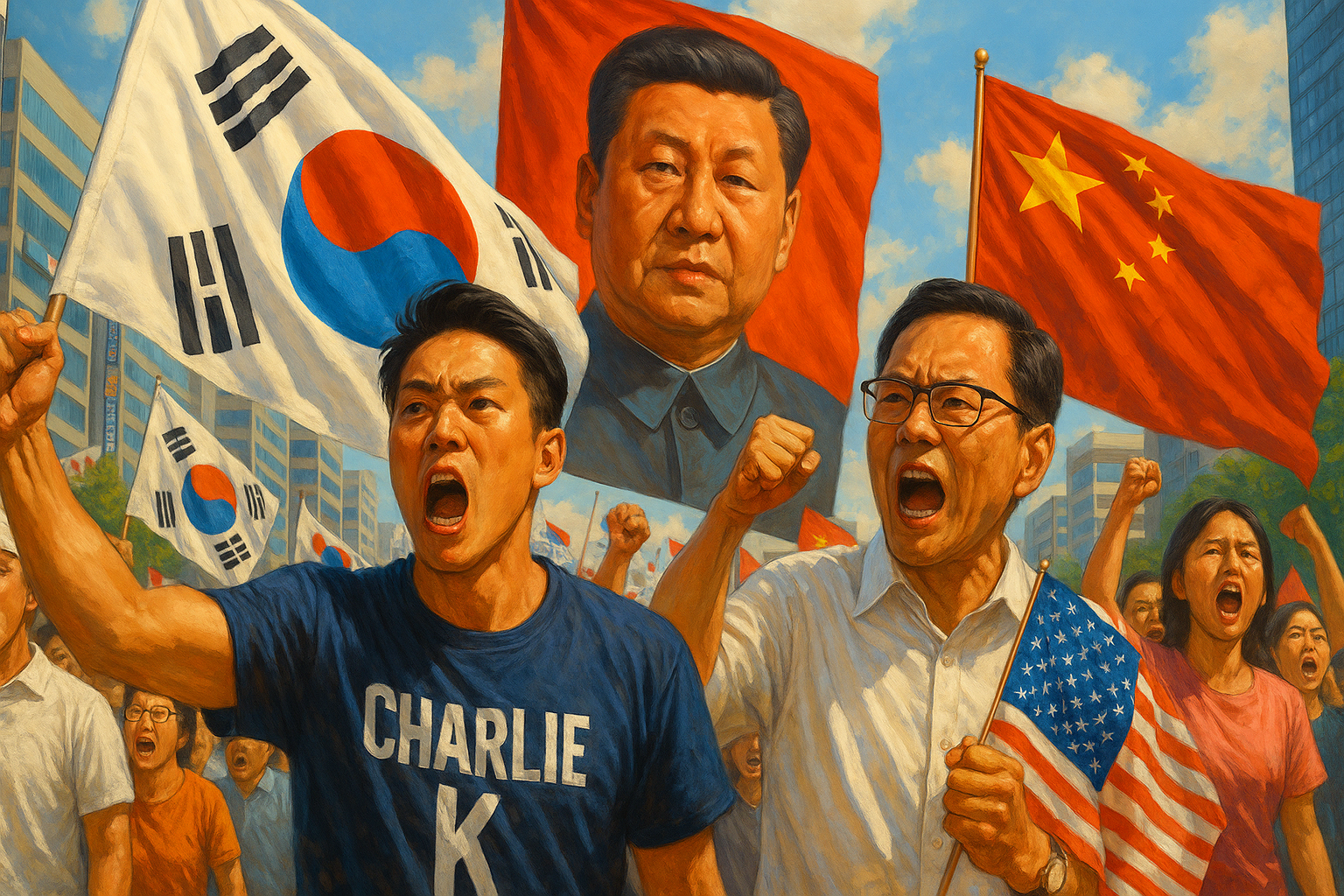Anti-China Uprising in Seoul Shakes Beijing’s Nerves

A wave of anti-China protests erupting in Seoul has cast a spotlight on the mounting tensions between South Korean civil society and the Chinese Communist Party (CCP). The demonstrations, marked by chants such as “Heaven will destroy the CCP,” reflect a broader regional unease with Beijing’s assertive policies and ideological expansionism. While the Chinese embassy’s unusually cautious advisory to its citizens urging them not to provoke Koreans, signals a rare moment of restraint, it also underscores the growing backlash against China’s global posture.
The protests, which began on September 28, were organized by conservative civic groups and drew hundreds of demonstrators to central Seoul. Marching from Seoul Station to Namdaemun, participants waved South Korean and American flags, wore shirts commemorating U.S. conservative activist Charlie Kirk, and demanded the arrest of President Lee Jae Myung. Their slogans targeted not just domestic politics but the Chinese Communist regime itself, revealing a convergence of national and international grievances.
The immediate trigger appears to be South Korea’s newly announced eight-month visa-free policy for Chinese tourists. Within minutes of the announcement, Chinese travel platforms recorded a 120% spike in searches for trips to South Korea. While the tourism sector anticipates a windfall during China’s Golden Week, the streets of Seoul particularly in Myeongdong, home to the Chinese embassy have become a stage for weekly protests. Demonstrators gather every Tuesday and Friday, chanting slogans in traditional Chinese characters and banging drums to amplify their message.
This public outcry is not an isolated phenomenon. Anti-China sentiment in South Korea has been steadily rising over the past decade. In 2015, only 16% of South Koreans held unfavourable views of China. By 2020, that figure had climbed to 40%. A 2022 survey by Seoul National University’s Asia Research Institute revealed that 91% of South Koreans viewed China negatively, and a 2024 Pew Research Centre poll recorded an even higher figure of 97%. These numbers suggest that discontent has evolved from policy disagreements to a broader rejection of the CCP’s authoritarianism.
Several incidents have fuelled this shift. The 2017 THAAD missile defence controversy, in which China imposed economic sanctions on South Korea, exposed Beijing’s willingness to weaponize trade. Remarks by a former South Korean president during a visit to Beijing suggesting Korea’s subordinate status to China, further wounded national pride. These moments crystallized a perception that China, under the CPC’s leadership, seeks not partnership but dominance.
Beijing’s global strategy, often described as “wolf warrior diplomacy,” has alienated many of its neighbours. The CPC’s foreign policy increasingly relies on coercion, economic leverage, and ideological projection. In Southeast Asia, maritime disputes have intensified. In South Korea, the CPC’s influence is viewed with growing suspicion, especially as pro-China politicians like President Lee Jae Myung face accusations of enabling Beijing’s soft power.
The Chinese embassy’s response to the Seoul protests urging citizens to avoid confrontation and expressing regret over the demonstrations marks a departure from its usual assertiveness. Typically known for defending China’s image aggressively, the embassy’s restrained tone suggests concern over escalating tensions. It also reflects Beijing’s awareness that overt confrontation could backfire, especially during sensitive periods like Golden Week.
Interestingly, criticism of the CPC is not limited to foreign voices. Chinese dissidents have begun to speak out against the regime’s tactics. An anonymous citizen argued that the uncivil behaviour of some Chinese tourists abroad stems from decades of indoctrination. He suggested that the CPC deliberately cultivates negative stereotypes to isolate its citizens and justify internal repression. Some Influencers known for outrageous behaviour and nationalist posturing, are seen by some as tools of state propaganda designed to embarrass Chinese people on the global stage.
Another source of anxiety for Beijing is the visibility of Falun Gong practitioners in South Korea. On September 20, a large group appeared on Jeju Island, openly displaying banners and boards detailing the CPC’s persecution of the movement. Their presence in tourist hotspots ensures that Chinese visitors are confronted with narratives the regime has long sought to suppress. For the CPC, such public exposure is a strategic nightmare.
The protests in Seoul, while rooted in local politics, are emblematic of a broader global reckoning with China’s authoritarian ambitions. From economic coercion to ideological control, the CPC’s methods are increasingly viewed as incompatible with democratic values. South Koreans, by taking to the streets, are not just challenging their own government’s policies, they are sending a message to Beijing: the days of unchecked influence are over.
As China continues to expand its global footprint, it faces a critical choice. It can either recalibrate its approach to embrace genuine cooperation and mutual respect, or it can persist in its assertive path, risking isolation and resistance. The events in Seoul suggest that many societies are no longer willing to tolerate the latter.




![From Kathmandu to the World: How Excel Students Are Winning Big [Admission Open]](https://www.nepalaaja.com/img/70194/medium/excel-college-info-eng-nep-2342.jpg)
